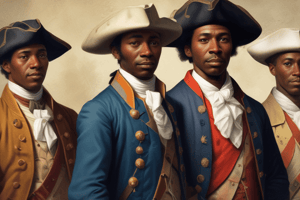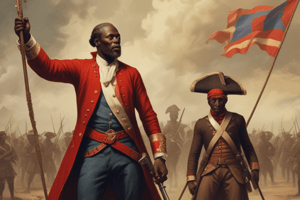Podcast
Questions and Answers
What was a significant compromise related to slavery in the Constitution?
What was a significant compromise related to slavery in the Constitution?
- The Bill of Rights
- The Separation of Powers
- The Three-Fifths Clause (correct)
- The Equal Protection Clause
The Constitution openly supported the institution of slavery.
The Constitution openly supported the institution of slavery.
False (B)
Name two figures highlighted as examples of African Americans advocating for justice during the Revolutionary era.
Name two figures highlighted as examples of African Americans advocating for justice during the Revolutionary era.
Phillis Wheatley and Benjamin Banneker
The compromises in the new republic created a legacy of struggle for ________ that would persist into future generations.
The compromises in the new republic created a legacy of struggle for ________ that would persist into future generations.
Match the following terms with their significance during the Revolutionary era:
Match the following terms with their significance during the Revolutionary era:
What was a major influence of the American Revolution on African Americans?
What was a major influence of the American Revolution on African Americans?
The British offers of freedom during the Revolutionary War encouraged enslaved people to join the Patriot cause.
The British offers of freedom during the Revolutionary War encouraged enslaved people to join the Patriot cause.
Name one key figure who contributed to the formation of African American communities post-revolution.
Name one key figure who contributed to the formation of African American communities post-revolution.
The post-revolution period saw the growth of free Black communities, particularly in ________ centers.
The post-revolution period saw the growth of free Black communities, particularly in ________ centers.
How did the Revolutionary War affect slavery in the North?
How did the Revolutionary War affect slavery in the North?
The Declaration of Independence was viewed by African Americans as a promise of universal rights.
The Declaration of Independence was viewed by African Americans as a promise of universal rights.
Match the following leaders with their contributions:
Match the following leaders with their contributions:
The war largely reinforced the system of slavery in the ________ where the plantation economy was entrenched.
The war largely reinforced the system of slavery in the ________ where the plantation economy was entrenched.
Flashcards
Three-Fifths Clause
Three-Fifths Clause
The Three-Fifths Clause counted enslaved people as 3/5 of a person for representation in Congress.
Fugitive Slave Clause
Fugitive Slave Clause
This clause required escaped enslaved people to be returned to their owners.
Contradictions of Liberty and Slavery
Contradictions of Liberty and Slavery
The tensions between slavery and liberty in the young nation were stark.
Betrayal of Revolutionary Ideals
Betrayal of Revolutionary Ideals
Signup and view all the flashcards
African Americans and the Revolution
African Americans and the Revolution
Signup and view all the flashcards
Revolution's Impact on Slavery
Revolution's Impact on Slavery
Signup and view all the flashcards
Declaration of Independence & African Americans
Declaration of Independence & African Americans
Signup and view all the flashcards
African American Participation in the War
African American Participation in the War
Signup and view all the flashcards
War's Impact on Slavery: Double-Edged Sword
War's Impact on Slavery: Double-Edged Sword
Signup and view all the flashcards
Emancipation in the North
Emancipation in the North
Signup and view all the flashcards
Slavery's Persistence in the South
Slavery's Persistence in the South
Signup and view all the flashcards
Emergence of African American Communities
Emergence of African American Communities
Signup and view all the flashcards
Constitutional Compromise on Slavery
Constitutional Compromise on Slavery
Signup and view all the flashcards
Study Notes
African American Experience During the American Revolution
-
African Americans responded to revolutionary ideals of liberty and equality by demanding freedom.
-
The Declaration of Independence, though aimed at British oppression, was interpreted by some as a promise of universal rights.
-
Enslaved and free African Americans participated in the Revolutionary War on both Patriot and Loyalist sides. British offers of freedom (e.g., Lord Dunmore's Proclamation) attracted some to the Loyalist cause.
Regional Differences in Emancipation
-
The response to slavery differed regionally during the Revolution.
-
Northern states saw gradual emancipation due to changing ideals and economics, but many remained in semi-servitude.
-
Southern states, deeply reliant on slavery, largely reinforced the institution, fearing loss of labor and power.
Post-Revolution African American Communities
-
Free Black communities grew in urban areas after the Revolution.
-
Mutual aid societies, churches, and schools emerged as vital parts of Black culture.
-
Key Black leaders like Richard Allen and Absalom Jones played pivotal roles in these institutions.
Constitutional Compromises and Slavery
-
The creation of the U.S. Constitution saw tensions regarding slavery.
-
Compromises like the Three-Fifths Clause and the Fugitive Slave Clause deeply entrenched slavery.
-
These compromises were seen by some African Americans and abolitionists as betrayals of revolutionary ideals.
Contradictions of Liberty and Slavery
-
The U.S. was founded on liberty while maintaining slavery, leading to contradictions.
-
African Americans challenged these contradictions through petitions, legal cases, and public discourse.
-
Figures like Phillis Wheatley and Benjamin Banneker used revolutionary language to advocate for equality and justice.
-
The American Revolution offered hope but ultimately fell short of full emancipation for African Americans.
Studying That Suits You
Use AI to generate personalized quizzes and flashcards to suit your learning preferences.




